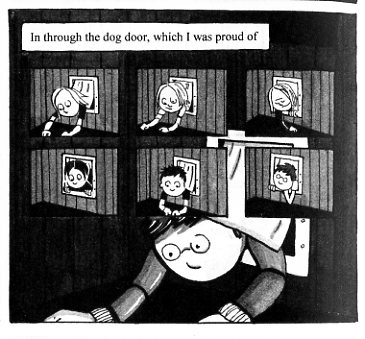If you’ve seen the tcj.com homepage recently, you know that we’ve been joined here by a spanking new blog called The Panelists, featuring Derik Badman, Charles Hatfield, Jared Gardner, Alex Boney, Craig Fischer and Isaac Cates (my apologies if I forgot anyone!)
To kick off their blog, The Panelists are doing a round-robin where each of them look at one panel from a comic of their choosing. It seemed like a fun idea, so I thought I’d
So here we go.

This is a particularly important panel from Ariel Schrag’s Likewise. It’s the last panel of the first part of that book. It shows Ariel after a typically gut-churning date with her on-again, off-again girlfriend Sally. Ariel is returning to her house, crawling through the dog door to get inside. In a series of six panels inset in the larger panel, we see her performing this same act over and over; it’s something she’s done again and again over the last few years of her life. The little panels mimic the development of Schrag’s visual self-representation as we’ve seen it over the course of her career as a memoirist — from the first image which looks like she’s crawling out of her first book Awkward (about her freshman year in high school) to the last which looks like it comes from Likewise itself.
This panel doesn’t just swing backwards, though; like the dog door, it swings forward as well. It’s a hinge. Likewise recapitulates Schrag’s first three books in reverse order. The first section (which this panel ends) mimics the style and themes of Schrag’s third book, Potential, about her junior year. The second section of Likewise points to her sophomore book, Definition; the last one returns (in a roundabout way) to the themes and simple style of Awkward. So the images here don’t just show Schrag remembering her past; they show her crawling into her future.
Or, to look at it another way, the panel turns the past into the present and the future all at once. Likewise — and indeed all of Schrag’s work — is about the importance of, and the accretion of, her own life. It’s also about her comic, and about the conflation of that comic with that life. Schrag’s past is her comic, as this panel makes clear. But that past isn’t past; it lives with her. The comic is not what went before, but what she is now and what is coming. Each moment, each still instant, is not one panel, but many. The panels don’t just go forward; they lie on top of one another in layers of memory. The self goes across the page and down through the page, and since those layers make up the self what happens next is always already what has already happened.
In many ways, this is the inverse of the insight Isaac Cates offers in his reading of a significant Ghost World panel. Isaac argues that the Ghost World panel is a narrative and thematic turning point; it shows how Clowes’ and our perception of Enid changes. But Schrag’s panel doesn’t alter the narrative; if you didn’t have this picture, the story (such as it is) would still be the same — Ariel still leaves Sally, she still gets through high school. The panel doesn’t even really offer any especial insights of characterization; our view of Ariel doesn’t change because of what happens here.
So the panel is not significant because of its particular place in the narrative. Rather, the panel is significant because of the narrative’s place within it. All of Likewise, all of Schrag’s earlier books, are in this panel. The panel is the book; the moment is the life. You can’t look at this panel without seeing panels. If you push on that square, what you find behind it are more squares, opening down into the past that is also the future. You can take the panel out of the comic, but you can’t take the comic out of the panel.

This means war!…
Reading this (and others you’ve written on Schrag’s work) really enforce how much more I enjoy your critiques, Noah, when you are writing about a work you like. Once again, you make me want to go read Likewise (It’s been on my to read list since the roundtable awhile back).
Ah well; perhaps the positive writing just seems more appealing because it’s so rare?
I think it’s because it makes me want to engage with the work.
I love this panel as well-thanks for helping me see why. It is a great example of comics’ ability to present multiple moments, or to allow us to see the present and the pasts simultaneously. Now I want to go read LIKEWISE again
I didn’t know you were a fan of hers! Have you written anything about Schrag? Could I get a link if you have?
I haven’t, but I wanna. But then my students always go and write something about her and it is so bad and wrong I am afraid I will make as big a hash of it as they do. POTENTIAL is probably my favorite.
Now I’m intrigued…where do your students go wrong?
Erm. They might be reading….
LOL, Jared. Good to know nothing’s changed, I guess…